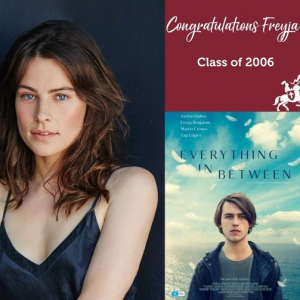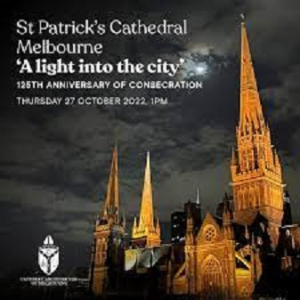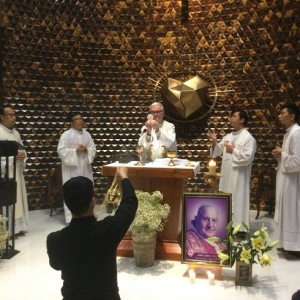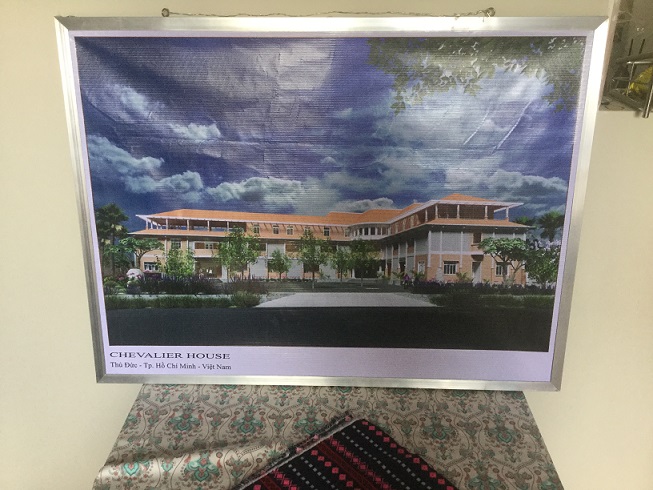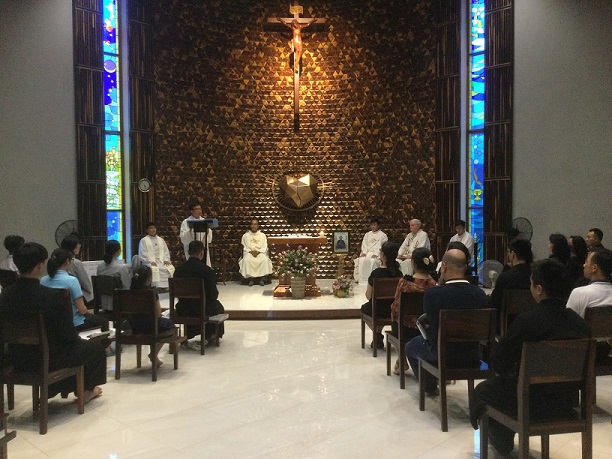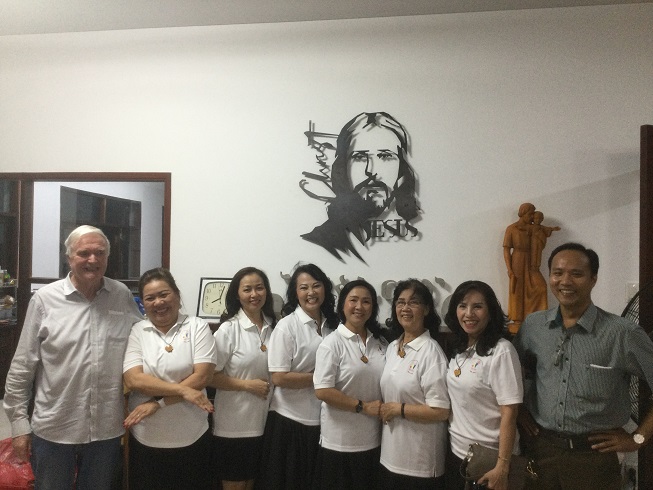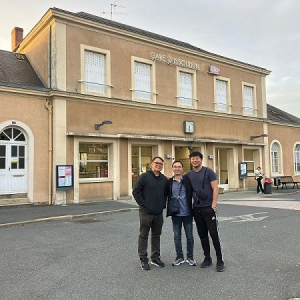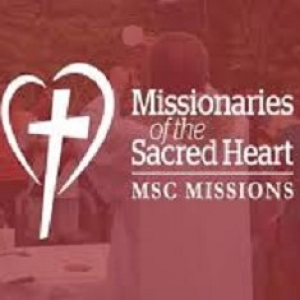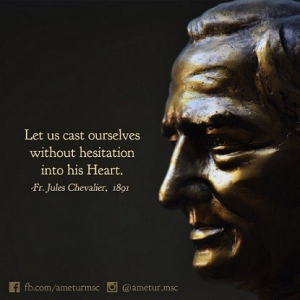Peter MALONE
Naked Singularity
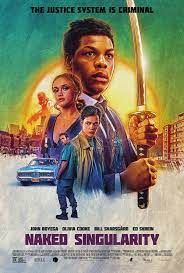
NAKED SINGULARITY
US, 2021, 93 minutes, Colour.
John Boyega, Olivia Cooke, Bill Skarsgaard, Ed Skrein, Linda Lavin, Tim Blake Nelson.
Directed by Chase Palmer.
A comparatively brief, sometimes puzzling, sometimes intriguing New York drama. (Surprisingly, the central characters are actually British and another has Swedish background.)
The basic theme is interesting, a New York lawyer, working for hard cases who don’t make his presentation any easier, is the subject of continuous reprimands from a very severe judge, played by veteran Linda Lavin. He has a friend and coworker, rather sleazy in his attitude towards morality, played by Bill Skarsgaard. Also in the act is a criminal who has inside information about crime and robberies and his contact in the office for reclaiming impounded vehicles. There is also a strange character (played by Tim Blake Nelson), who has theories about the world coming to an end, imploding. This has an effect on the young lawyer, on his imagination and dreams, on his fears, with one commentator saying this is not science fiction but “cosmic sensibility”.
The lawyer is played by John Boyega, the young woman by Olivia Cooke, the sleazy gangster by Ed Skrein (as said, all British).
The drama of the film is the lawyer’s decision to participate in using his wits, urged on by his associate, to become involved in robbing a client and his million-dollar drug deal. So, some tension in this part of the action. And, the lawyer exerting some kind of nobility after this immoral/amoral action.
- The title, explanations, physics and metaphysics, individuals and achievement?
- The New York setting, public defenders, court hearings, towing companies and storage, options, the city background, apartments? The warehouse, cars, drugs? The musical score?
- The focus on Casi, public defendant, explanation of himself, age, experience, black, straightforward, working for his clients, their cooperation and lack of cooperation, priming them to nod at the right time, the disappearances from the hearings? The interactions with the judge, her severity, harshness, condemning Casi?
- The introduction to Leah, her background, criminal record, drugs, her contacts, working in the towing Centre, Craig, his approach, the bribe, contacting him afterwards, the sexual liaison? The car, the drugs, storage, the plan?
- Dane, public defendant, up-and-coming, friendship with Casi? Amoral? The link with Leah? The information about the drugs and the money? The discussions with Casi, trying to persuade him, the plan?
- Casi, the past with Leah, meeting, conversation, the night together?
- The drug dealers, Craig, the big bodyguard? The police, surveillance?
- Craig, the plan, the auction, being outbid in by the drug contacts?
- The execution of the plan, Casi agreeing, the current the money, Craig’s role, the bodyguard? Casi, removing the surveillance, the fight with the bodyguard? Dane and the cars? Leah and the cast? Her deal with Craig, the money deal on demands?
- The execution of the heist, the car, the money, later meeting, the suitcases with the money, Dane and his self-confidence? Casi breaking with Leah, each with their money?
- Casi returning to public defence after the suspension by the judge? His client, the need for bail, his having the money to supply the bail? His future?
Athena/ 2022

ATHENA
France, 2022, 93 minutes, Colour.
Dali Benssalah, Sami Slimane Anthony Bajon, Quassini Embarek, Alexis Manenti.
Directed by Romain Gavras.
This is a very stylised, even operatic drama set in the difficult suburbs of Paris. It has been written and directed by Romain Gavras (son of the celebrated director of political dramas, Costa Gavras), a director of films, music videos.
In many ways, the drama and central themes of this film, set in the district of Athena, are familiar (memories of such films over the decades about the suburbs as La Haine). There is a focus on three brothers, foreign backgrounds, the older involved in rackets and schemes, drug dealing, the middle brother a police officer with the action focusing on him and his handling of riot situations, the youngest something of an idealist, disturbed by the unexplained murder of their younger fourth brother, becoming a rabble rousing leader. And there are quite a number of interesting characters, amongst the police, amongst the leaders within the community.
However, it is the striking way in which the film has been made that makes such an impact. So many of the sequences are long single takes, rivalling any of the experts in single long takes like Robert Altman. And, they have been well rehearsed and orchestrated, not relying on special effects, having large supporting cast and extras, very elaborate sets and design, and the camera moving through all this with great fluidity, not drawing attention to itself, but involving the audience in the situations and with the characters. This is one of those films that will be part of courses on cinematography and direction.
For French audiences, this is an allegory of life in France, the role of the many migrants, racial hostilities, the role of the police and brutality, the role of government and the possibilities for revolt. For non-French audiences, there may be some difficulties in identifying with the characters, which means that the response is observing what is going on (along with the admiration for the techniques).
- An allegory of contemporary France? Civil unrest? Violence? Racism? The role of the extreme right?
- The work of the director? The career of his father and social justice films? His own career in music videos and documentary?
- A French response to the film and the situations and characters? For audiences outside France, observing rather than empathy? The staging of the situation, the unrest, the violence, the protest, the role of the police, the role of the media and reporting, crises increasing?
- The impact of the cinematic style, the range of very long takes, the focus on individuals, the various angles, the camera returning, from the view ahead, to the side, to the view behind, continued action? The main style of the film like this? And the insertion of shorter more traditional takes? The ultimate effect of movement, of spectacle, tragedy?
- The musical score, the operatic excerpts – and the excerpts with some of the spectacular stagings and tableau, making it all operatic?
- The area of Paris, Athena, the buildings, apartments? The death of the young boy, allegedly by the police, perhaps by the extreme right disguised as police (and the final sequence and the burning of the police uniforms)?
- The brothers, their stories, intertwined? The introduction to Abdel – and his role as a policeman, the long take of his walking to address the crowds? His working with the police, try to resolve the situation, interactions with his brothers? Moktar, the older brother, the drug dealing, smuggling the rifles? Karim, the younger brother, resenting the murder of the little boy, leading the crowds, the protests, leading to Revolution?
- The background of the police, the police chiefs, the squads of police going into the area? The focus on Jerome, one of many in the squad, later taking him up, in the file, his mask, the beatings, the withdrawal, the Molotov cocktail the platoon? His being burned, escaping, his being taken, held by Abdel? Abdel’s anger, the threats? His eventual escape?
- Abdel, conscientious, the police, the confrontation with Karim, the personal plea, the appeal about their mother? Seeing Karim and his death, taking his body? Relying on Moktar, Moktar’s background, the confrontation, his bashing Motatr? In the building, taking all, anger, shooting at him, letting him go?
- Mock car, his squad, self-centred, drugs and arms, the big safe, going to the building, digging the hole, the role of the police, his contacts within the police? Abdel coming in, the confrontation, mocked are appealing to their being brothers? And Dell continually punching him?
- Karim, seeing him in action, his age, so it, the various associates, his leadership, the staging of the protests, the monitor cocktails, initially at the press conference, continued action? The meeting with Abdel, with the Molotov cocktail, throwing it, its being shot at, exploding in killing him?
- The role of Sebastien, working in the garden, silent, cracking open safe, setting up the cylinders, setting the block on fire?
- The spectacular aspects of the presentation, civil unrest and national tragedy, the more intimate telling of the three brothers and their story and their dead younger brother?
- The symbolic nature of the film, allegory of what could erupt in France?
Chevalier College, a student achievement in film, Freyja Benjamin.
Chevalier College, a student achievement in film, Freyja Benjamin.
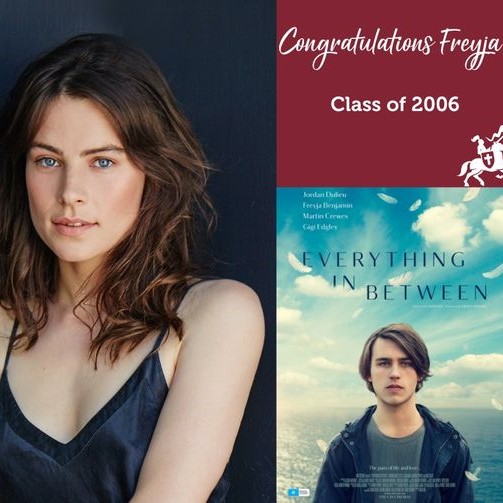
The College reports: This week we were thrilled to hear from past student Freyja who has just completed her first feature film - and its playing at the Empire Bowral, opening today.
"Recently I completed my first feature film, titled “Everything in Between”, where I am playing a leading role and wanted to let the school know because so much of my love for acting had its genesis at Chev. The movie deals with complex social issues including mental health, family dysfunction and substance abuse.
It feels pretty special to me that this film is showing in the place I grew up.
Chevalier College has many deep and important memories for me. I attended the college as a quiet and creative student for the years 2001-2006. I studied drama all the way to the HSC and played Bilbo Baggins in the theatrical production of The Hobbit many years ago, which was a life shifting event for me because I never saw myself (someone who identified as quiet and shy) as having the ability to score the lead part in the school play." Freyja Benjamin.
A review of the film from Australian Catholics:
An alienated teenager learns to find meaning and purpose through the pain of love and loss.
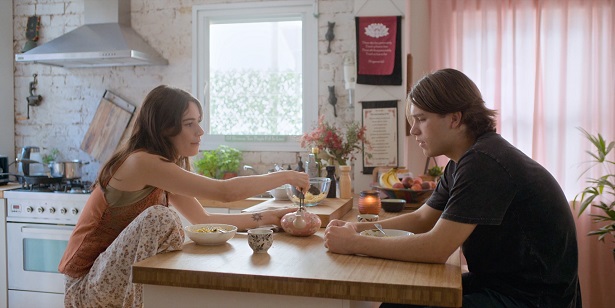
EVERYTHING IN BETWEEN. Australia, 2022. Starring Jordan Dulieu, Freyja Benjamin, Gigi Edgley, Martin Crewes, Siham Yahya, Benjamin Mathews. Directed by Nadi Sha. 90 minutes, Rated M (Mature themes, coarse language, sex and drug use)
About 20 minutes into this drama, a young hippie character from the US, wandering in Australia, Liz (Freyja Benjamin) explains the title. The parameters are birth and death and everything in between is life, to be lived. And this is important for the other central character, Jason (Dulieu) whom she has encountered at the hospital.
This is an Australian film with universal themes. As the title indicates, it is a film about life, the meaning of life, those disillusioned with life and wanting to end it as well as those whose physical condition and deterioration are leading to the end of life. The setting is Sydney – the southern and eastern beachside suburbs, the interiors of a fashionable home, many visits to the Royal Sydney Hospital.
The film is introduced by a hippie-like beach party, drugs and alcohol, music and dance, on the beach. And that is where we find Liz, with the drugs, but having some kind of physical as well as mental turn, wandering, at the high cliffs edge. At which stage we are introduced to Jason, aged around 20, immediately seen as morose if not depressed, riding in a taxi, monosyllabic replies, wandering a cliff path and standing on the edge, wanting to jump, or fall.
So, both meet at the hospital, Jason fussed over by his would-be glamorous mother, his father glimpsed having an affair with his secretary, but coming to take Jason home. It would seem that Jason has had a loner history, no friends, reading science books in his room, but no real life (and no flashbacks to explain or illustrate this).
Of course, we can see that the problem can be related to his relationship with his parents. As the film emerges, they are a mixture of love, good sense, bewilderment, self-preoccupation, worry about what they should do. In fact, his father (Crewes) is better at being positive with his son than the often flighty but loving mother.
The important part of the film is the meeting between Liz and Jason, accidental, incidental, but a reminder that sometimes one small gesture, one small invitation can lead to changes and unanticipated benefits.
The film shows the friendship between Liz and Jason, Jason and his therapy, and interviews with doctors, the possibility of going into an institution, but his concern about Liz and her interviews with the doctors, diagnosis of a rare physical condition that requires surgery.
Liz is a strong character though at times overwhelmed by her prospects, especially on the eve of serious surgery. Jason, on the other hand, responds to another person in a way that he never has before.
A small film, themes which have been treated both in film and in documentary, but 90 minutes with characters who are worth the attention (even to the parents despite their limitations and irritations), and, as we look finally at the photo of Liz and Jason, we read her note about life and everything in between.
Peter Malone MSC
Released 20 October 2022
Daramalan College, gathering to celebrate 60 years.
Daramalan College, gathering to celebrate 60 years.

October 22nd saw a celebration at the college for its 60 years, serving the north side of Canberra, originally for boys, later education boys and girls. (The Daramalan Alumni Facebook page is worth looking at, noting and acknowledging alumni achievements.)

Representing the MSC at the party were former Principal, Jim Littleton MSC,

Barry Smith MSC who worked (and works) for college finances and management, and Kimi Vunivesilevu MSC, college chaplain and parish priest of Kippax.

Many MSC brothers and priests and, in early days, students on their way to priesthood, have been on the staff of Daramalan. (Of your editor’s ordination group six of the seven had their first appointment at Daramalan.)

Congratulations for 60 years.

St Patrick’s Cathedral, Melbourne, Celebration, 125th anniversary of consecration (and some MSC memories).
St Patrick’s Cathedral, Melbourne, Celebration, 125th anniversary of consecration (and some MSC memories).
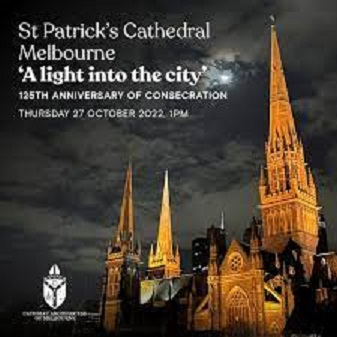
In 1939, Sacred Heart Monastery, Croydon, opened. That year, Ted Harris and Brendan Sykes were ordained in the cathedral – and this continued into the mid-1950s. That means quite a number of MSC priests ordained there. Over the next twenty years, priests from Victoria were ordained in the cathedral while others went to their home state. Since the 1980s, priests have been ordained in local cathedrals or churches.
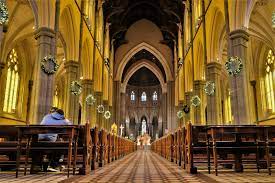
The Poorman Masses/ Masses for the Poor. From the late 1960s and through the 1970s, the MSC organised these Masses in St Patrick’s on the Feast of the Sacred Heart, attended by students from Melbourne Catholic schools. Food was collected for distribution. Later they moved to parish celebrations.
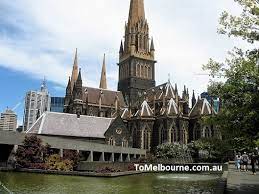
Googling Poorman Masses, this photo came up –
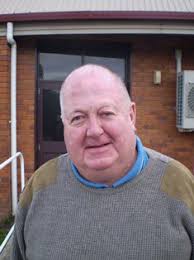
John O’Connor had a major role in establishing the Poorman Masses (which moved to inclusive language Masses for the Poor).
Uncle Bob's Letter from Vietnam, October 2022
UNCLE BOB LETTER FROM VIETNAM: OCTOBER 2022
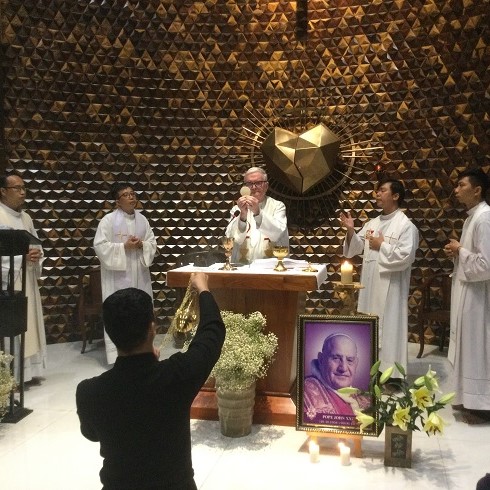
Dear friends. Greetings from Saigon (Ho Chi Minh City) Vietnam.
I hope you are doing ok, and staying dry at least. You must be sick and tired of rain, but I hope that none of you or your loved ones have been affected by the floods. Here in Saigon it is nearing the end of the rainy(monsoon) season…but that is a bit of a moveable feast. Thus, the weather is getting cooler 25-29! However, Central Vietnam bears the brunt of monsoon season with lots of flooding, landslides etc. Meanwhile, tourists have begun coming in good numbers again. Despite Covid being under control, the wearing of masks is compulsory in many situations, including on your motor bike! I guess, with traffic the way it is, one can spend a lot of time side by side in traffic jams! Still, many wear their masks while exercising in the park.
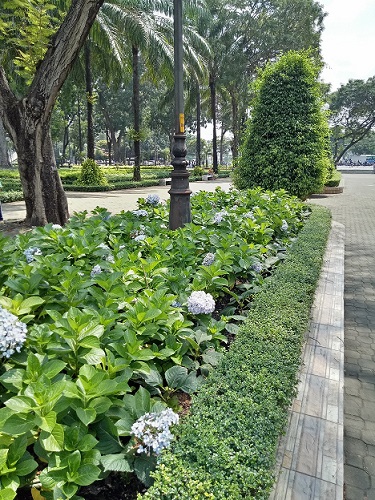
I am fine and the students are well into the semester. My visa only lasts 30 days, so off I go with one of the men, armed with my Cambodian e-visa, pay the bribe to leave Vietnam, bribe to get into Cambodia, toilet stop in the casino on the C side of the border, bribe to depart C, bribe to get back into Vietnam. Interesting. However, for the next visa, I will do a quick trip to our men in the Philippines...less bribes, maybe?
October is a crazily busy month here for the MSC. The community is scattered across a number of smaller houses, but the good news is that the local government has finally approved the next stage of our scholasticate (the place already has a beautiful chapel etc) eventually allowing us to house all the students together.
Some of the events have included: gathering for student’s feast day (John XXIII); recollection days for all; reflection for final vows men; ongoing formation; and on Chevalier day, the 21st, we gathered with Lay MSC and MSC sisters, to begin the celebrations for the 20th anniversary of our foundation here. Plans are well advanced for activities over the next twelve months, the prayer has been written and prayed, logo done, T shirts printed…it’s on for young and old.
October is not over yet: The Provincial returns for a week; a renovated student house is blessed; three men to be ordained deacons on the 30th. It’s a miracle that the students keep up with their studies. Some are doing 9 subjects!
How keeping sane? The goodness of the men; contemplation/prayer; walks in the nearby park, where I found a bed of blue hydrangeas…shades of Coogee.
Take care. God bless. Spare us a prayer when you can. Love. Uncle Bob
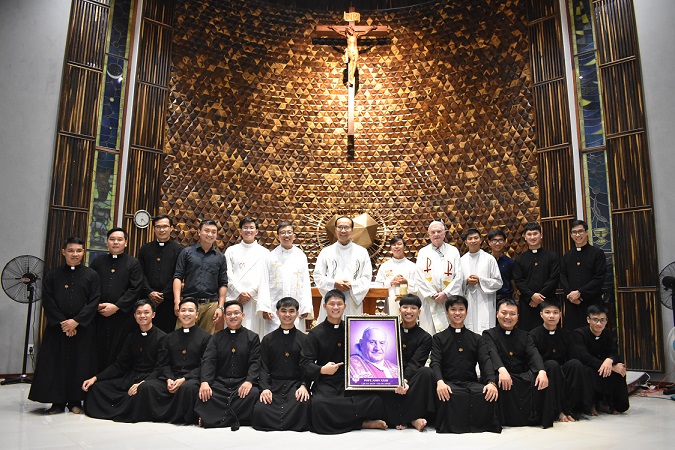
Novice masters in Issoudun, Australia, Philippines, Korea.
Novice masters in Issoudun, Australia, Philippines, Korea.
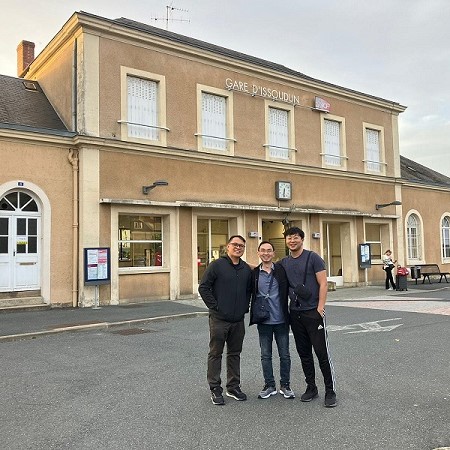
Prior to the Novice Masters’ conference in Rome, some of our confreres were in Issoudun, and for the anniversary of Jules Chevalier.
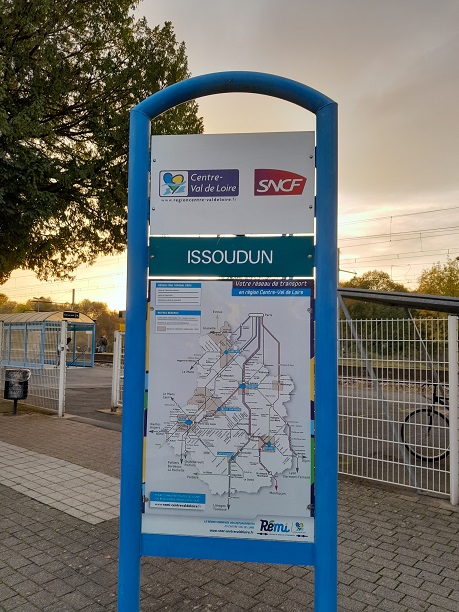
Khoi writes: ‘On this occasion, I am blessed to be in Issoudun, having visited Richelieu and other places connected to his life.
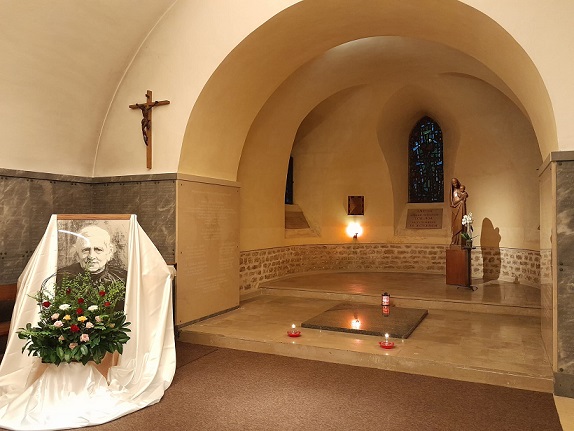
The crypt
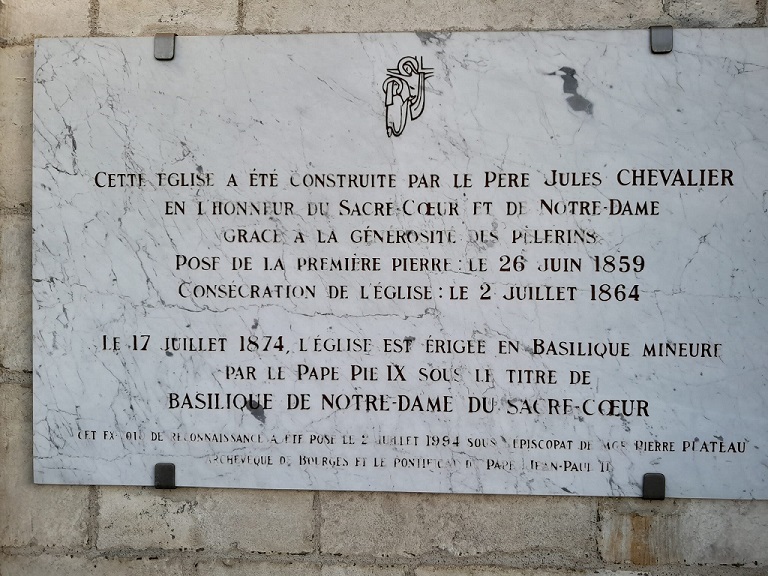
I am here with Nords (novice master of the Philippines) and Ireneo (novice master of South Korea).
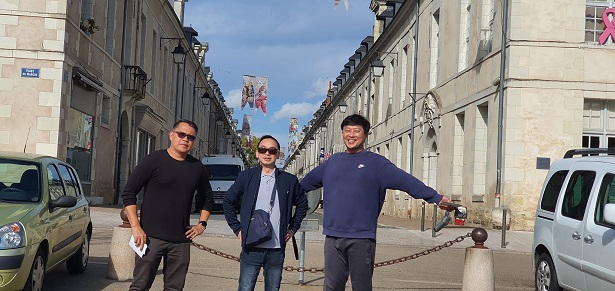
They are great companions on my journey. Fr Yongki is a wonderful and generous host, as well as the international community here.
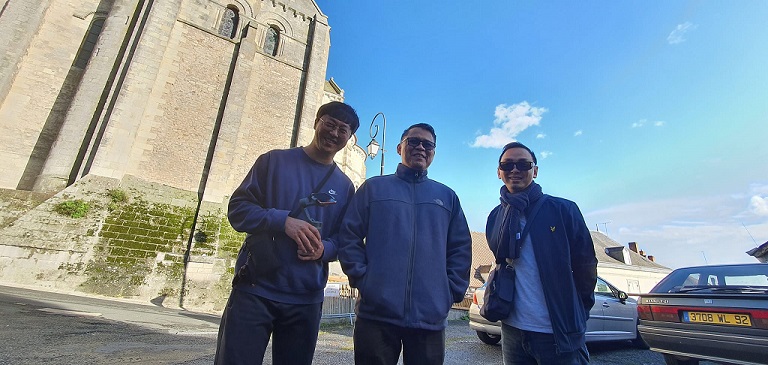
Celebration, October 21st
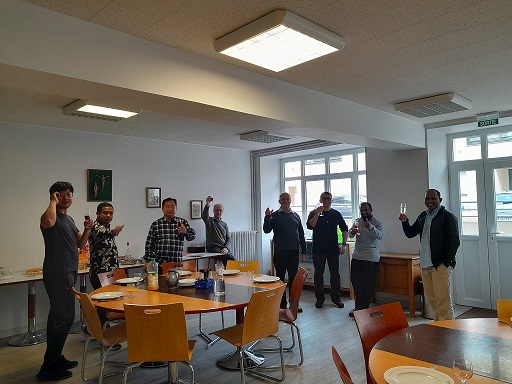
Mission Sunday – Worldwide. And we celebrate MSC Missions worldwide.
Mission Sunday – Worldwide. And we celebrate MSC Missions worldwide.
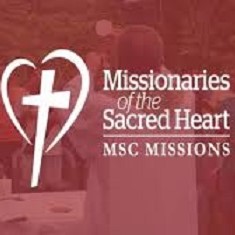
Jules Chevalier called us ‘Missionaries’ in whatever we do. But he wanted us to be missionaries in other lands, rejoicing in 1881 to accept missions in New Guinea., French to Sydney and Yule Island, Germans to New Britain. Much later, Americans to New Ireland.
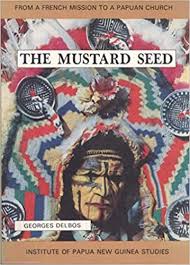
In Australia, we look to the land’s indigenous people and the Northern Territory, then we look north and see the PNG Province, look east and see the Pacific Islands Province, look west and we see Indonesia.
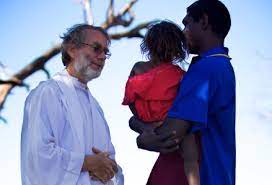
And this weekend, we look to Africa, the work of the French, Belgians, Austrians, Irish – and, more recently from Latin America.

We look to Latin America, the work of the Spanish, the Dutch, the Germans, the Italians, the Canadians.
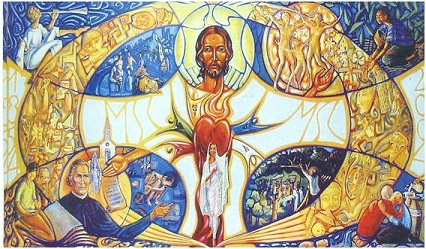
We look to Asia, the work of the Dutch, the Australians – but in Korea, India, Vietnam, Japan, the combinations of Missionaries from within Asia, and the Asian provinces and unions sending out Missionaries.
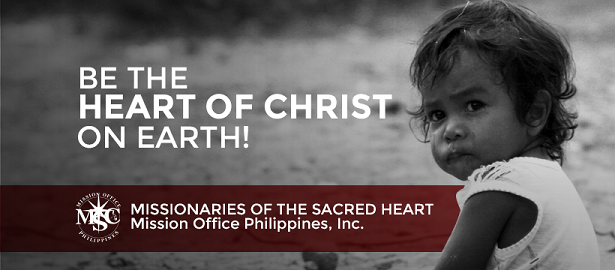
A question from the General Administration is whether Europe is becoming ‘mission territory’.
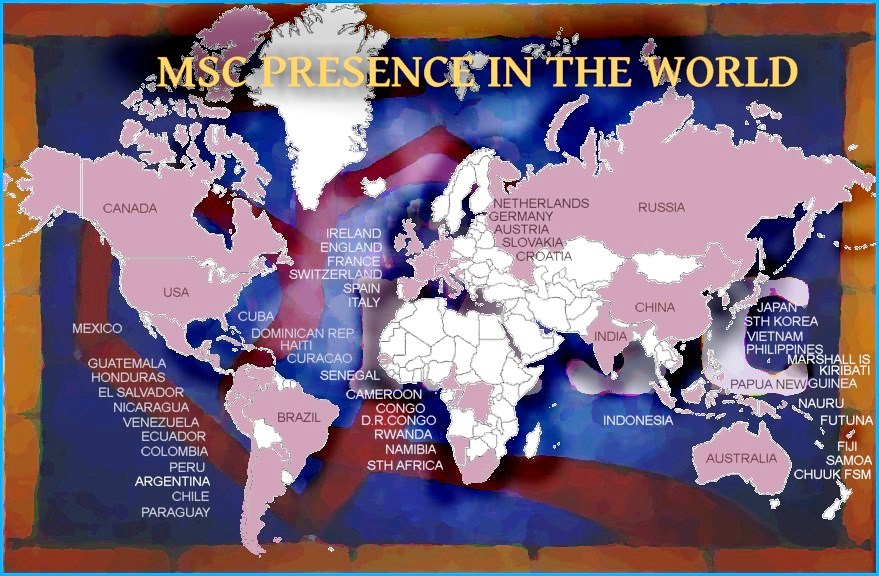
Jules Chevalier Day, 115th anniversary of his death.
Jules Chevalier Day, 115th anniversary of his death.
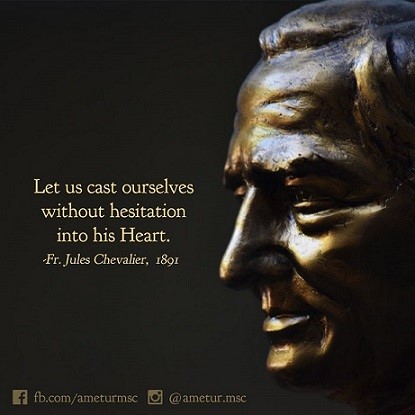
We are thankful for the heritage from Jules Chevalier
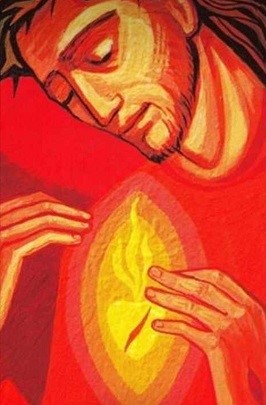
A devotion that led to a Heart Spirituality.
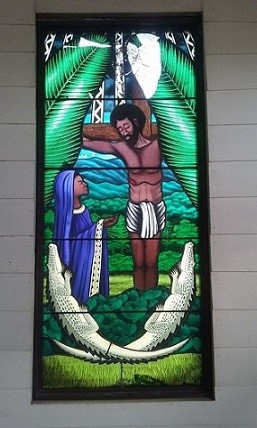
An appreciation of Mary, Our Lady of the Sacred Heart
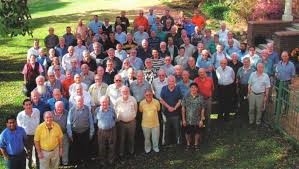
Brothers and priests, Missionaries of the Sacred Heart
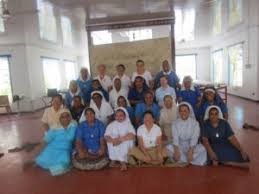
Sisters, Daughters of Our Lady of the Sacred Heart
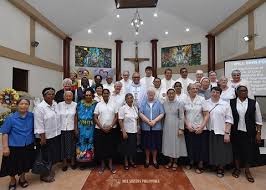
Sisters, Missionaries of the Sacred Heart
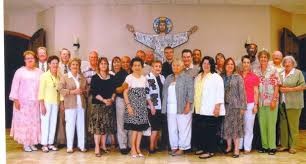
Lay MSC
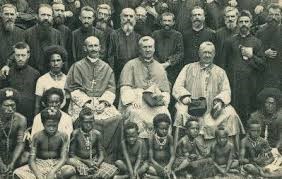
Missionaries throughout the World
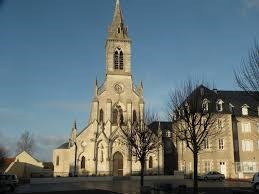
Basilica Issoudun and Cor Novum
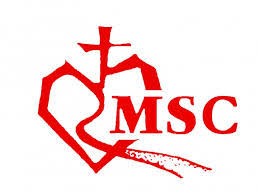
and more...
Master, The/ 2012
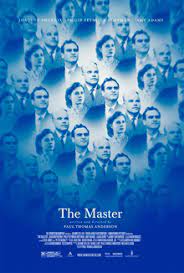
THE MASTER
US, 2012, 138 minutes, Colour.
Joaquin Phoenix, Philip Seymour Hoffman, Amy Adams, Rami Malek, Ambyr Childers, Jesse Plemons, Jilian Bell, Laura Dern.
Directed by Paul Thomas Anderson
The Master implies a disciple. This quite long film spends its first fifteen minutes offering a sketch of the disciple, Freddy Quell (Joaquin Phoenix). At the end of World War II, he is on a Pacific Island with a squad, mucking around, sex-preoccupied, chopping cocoanuts and making liquors. Then he is in rehabilitation, mentally affected by his navy experiences and fighting the Japanese. He becomes a photographer in a large store (still drinking, still sexually active) but fights with a customer. He picks cabbages, still drinking. When an old man dies because of his alcohol concoction, Freddy flees, jumping aboard a cruise ship.
When he comes to, he meets the Master, Lancaster Dodd (Philip Seymour Hoffman), a benign looking presence with a way with words (and sometimes breaking into song). His pregnant wife (Amy Addams) assists him. There is an entourage for the wedding of his daughter, which the master conducts.
The bulk of the film concerns the friendship between master and disciple (sometimes touches of the intimate). We watch the charm of the master as well as his relentless ‘processes’, more repetitive and relentless, than military training or old-style religious novitiates. In urging Freddy to recover memories, re-live his past, the master is exercising a kind of brainwashing. Freddy becomes more and more dependent, sometimes resisting (and drinking), sometimes adopting the master as a father-figure.
There is an alarming episode when the master is arrested because of accusations of financial fraud and is jailed, as is Freddy who has violently taken on the arresting officers. It is a frantic breaking point for Freddy.
At times, the master’s wife is more stern and demanding on Freddy than the master is. She is suspicious of Freddy’s motives, perhaps a spy.
The film does not offer a neat ending. It is quite open. The master expands his ministry to England. Freddy rides away, lapsing into his old way of life.
There has been much comment on the links between the film and Scientology. Whether this be the case or not, The Master and the portrait of Lancaster Dodd, his presumptions about himself, his alleged mysticism, his writings (with Dianetic overtones), his making it up as he goes along, suggest how L. Ron Hubbard might have developed Scientology. (Paul Thomas Anderson also referred to the life of John Steinbeck and Navy stories told him by Jason Robards.) The portrait of Freddy reminds us of searching people and the need for some kind of leadership, even dependence.
Paul Thomas Anderson continues his thoughtful studies of disturbed characters and disturbing situations, Boogie Nights, Magnolia and There Will Be Blood.
- The role of cults and cult leaders in the US on the 20th century? References to L.Ron Hubbard? Writings, seminars, behaviour and control?
- The settings, World War II, the Navy, after the war, jobs for former Navy personnel, coping or not? Rehabilitation processes? The contrast with the yacht, the world of Lancaster Dodd, ‘s homes, meeting places, seminars, conferences? And the scenes of bikes in the desert? The musical score?
- The structure of the film, the double focus, on Freddy, on Dodd? Intertwining of the themes? The interdependence of the characters? The influence of each on each?
- Freddy, first seen after the war, on the beach, the large woman figure in the sand, sexual overtones? The fellow sailors and their style? The flashbacks to the war, Freddy and his service, its effect? Rehabilitation sequences? After the war, jobs, photography and the fight, his brew in the poisoning of the old man, his flight? The visit to Doris, her place in his memory? His getting on the ship, the encounter with Dodd? Dodd taking an interest in him, his drinking, the making of the brew and its poisonous contents, the bond between the two?
- Lancaster Dodd’s, age, experience, his opinion of himself, his studies in philosophy, his theories, his writings? His setting himself up, The Cause? His relationship with his wife, love, yet her dominance and control? His daughter, son-in-law, the celebration of their marriage? His interest in Freddy, Freddy the wedding, the alcoholic drink, the discussions? Dodd’s beliefs, informal lives and meetings? The intrigue with Freddy and previous lives?
- Dodd, his seminars, the fashionable clients, the critic and his denunciation, hypnotism, questioning the philosophy, Dodd and his reaction, anti-hypnotism, waking people up to themselves? Freddy, his listening, bashing the critic? Dodd and applause, reputation, 1950? The later criticisms, the charges against him for appropriating money, his arrest, Freddy fighting with the police, his arrest? In jail? The conversations and interactions?
- Dodd and his experiments with Freddy, the private consultation, the close-ups, the list of questions, repeated, the effect on Freddy, eliciting memories? About his life, his parents, sex with his aunt, memories of Doris? His drinking? The further questions, his not being allowed to blink, starting the questions again? The overall effect of the experience? Yet his continuing to drink, Mrs Dodd and her criticism? But a sense of belonging, loyalty? Brainwashing? Father-figure?
- The travels, New York, Philadelphia and the social set, The Cause and Dodd’s meetings?
- Further experiments with Freddy, the wall and the window, eyes closed, the audience observing? The psychological effect on Fredy? The repetitions? The memories?
- The family and their suspicions, dislike of Freddy, complaining to Dodd? The encounter, the three, Dodd, Freddy and his son-in-law?
- The buildup to the first conference, mid-1950? Phoenix? The crowds, Dodd’s preparing, celebrity, his speech, talk of laughter? Freddy, and discussions with the publisher, the publisher critical, and Freddy bashing him?
- Freddy and Dodd going to the desert, the digging up of the case, the book, its publication, its theories? Adulation? The socialite, Helen, her questioning the methodology, Dodd roaring at her?
- Freddy, out in the desert, the family, the motor bike, driving fast or to destination, Freddy driving away and disappearing?
- Freddy, his visit in the past to Doris, his love for her, her being young, her affection for him? His going away, not returning? Coming back, the discussions with her mother, Doris married with children?
- Freddy, sitting in the cinema, tracked down by Dodd? The invitation to come to London? The progress of The Cause, Dodd’s wife and her criticism of his drinking? Dodd, inviting him to stay, the intimacy of Dodd singing Slow Boat to China and its lyrics? Giving him an ultimatum, if they were to meet in another life, Dodd would be a ruthless enemy?
- The final, Freddy, gaunt, separated from Dodd, drifting, the prostitute and the sequence with her?
